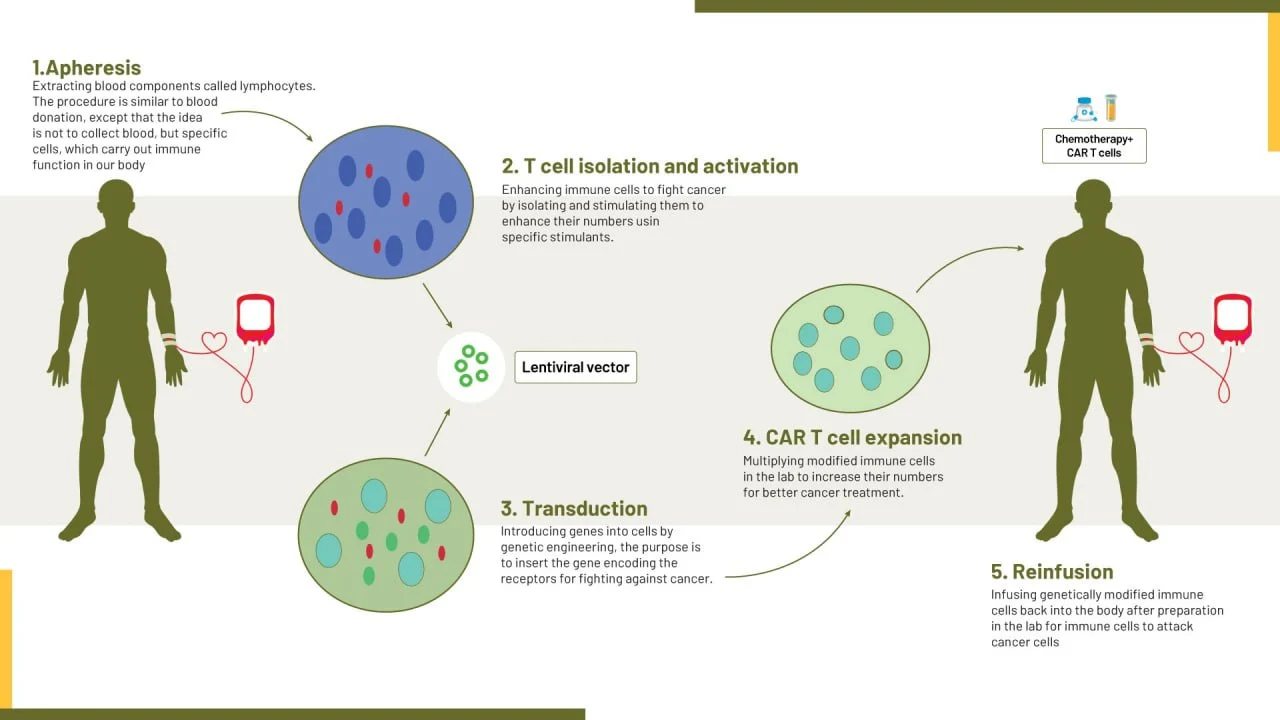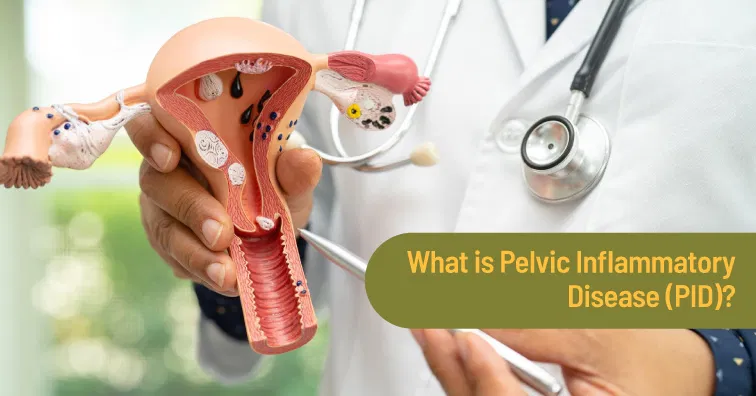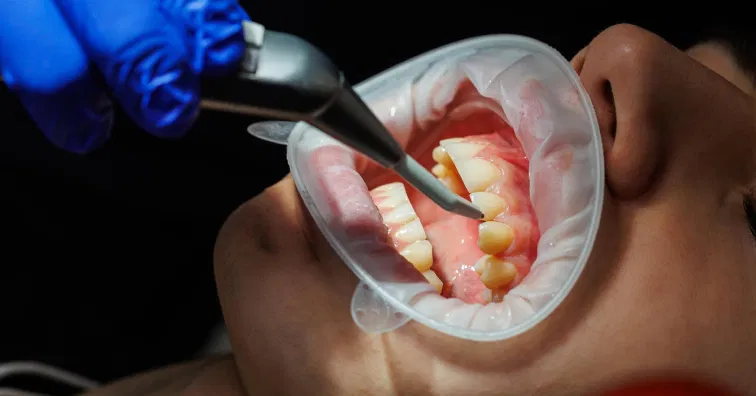Car-T Cell Therapy
CAR-T Cell therapy, a groundbreaking treatment offered at Cytecare Cancer Hospital in Bangalore, delivers unparalleled benefits in the fight against cancer. By harnessing the body's natural defense system, this innovative therapy stimulates the immune system to specifically target cancer cells, leading to greater clinical efficacy. Unlike targeted agents, CAR-T Cell therapies directly activate the immune system, resulting in remarkable results.
NexCAR19 is a prescription drug developed by ImmunoAct for treating specific relapsed or refractory B-cell cancers (lymphomas and acute lymphoblastic leukemia). It involves genetically modifying your body’s T-cells in a controlled laboratory setting, and then reinfusing the modified T-cells back to the patient, which are empowered to identify & destroy certain B-cell cancers.
With CAR-T Cell therapy, patients can experience remarkable efficacy, even if they haven't responded to traditional treatments like chemotherapy and radiation . The therapy's success lies in its ability to precisely target cancer cells while preserving healthy cells, minimizing collateral damage. Moreover, patients who undergo CAR-T Cell therapy report sustained periods free from cancer recurrence, unlocking a chance for a significantly improved quality of life.
One of the greatest advantages of NexCAR 19 or CAR-T Cell therapy is its potential for diverse applications. Ongoing research explores its effectiveness in treating various solid tumors, indicating its promising role in revolutionizing cancer treatment across different cancer types. The therapy has shown exceptional outcomes in clinical trials, with notable increases in survival rates among patients. This signifies a transformative shift in cancer treatment and management. Previous treatments were limited to surgery, chemotherapy, and radiotherapy. CAR-T Cell is a type of treatment for waking up the body’s immune system so that our own immune system can act against cancer.
Benefits Of CAR-T Cell Therapy
CAR-T Cell therapy offers several significant benefits for cancer patients. Let's take a look at some of the key benefits of NexCAR:
- Targeted Treatment: One of the most remarkable benefits of CAR-T Cell therapy is its targeted approach. Unlike traditional treatments such as chemotherapy or radiation, which can harm healthy cells and cancer cells, CAR-T Cell therapy focuses solely on cancerous cells. This targeted attack minimizes damage to healthy tissues, reducing the side effects often associated with traditional cancer treatments.
- Long-lasting remission: CAR-T Cell therapy has shown tremendous effectiveness in treating certain types of cancer. In clinical trials, it has achieved remarkable response rates and even induced complete remission in some patients. These promising results have been particularly notable in patients with certain forms of blood cancers , such as acute lymphoblastic leukemia (ALL) and non-Hodgkin lymphoma (NHL). CAR-T Cell therapy has shown the potential to provide long-lasting remissions and significantly improve patient outcomes
- Treatment for Relapsed or Refractory Cancers: For patients facing relapsed or refractory
cancers, where previous treatments have been unsuccessful, CAR-T Cell therapy offers new
hope. It has demonstrated effectiveness in cases where other treatment options have
failed. By utilising the patient's own immune cells and genetically modifying them to
specifically target cancer cells, CAR-T Cell therapy can overcome the resistance of
cancer cells to traditional treatments.
- What type of cancers does NexCAR 19 CAR T-cell therapy treat?
- B-cell Acute Lymphoblastic Leukaemia
- High grade B-lymphomas
- Low grade B-lymphomas
- What type of cancers does NexCAR 19 CAR T-cell therapy treat?
- Reduced Need for Conventional Treatments: CAR-T Cell therapy has the potential to reduce the need for conventional cancer treatments in some cases. Successful CAR-T Cell therapy can lead to extended periods of remission, potentially minimizing the need for ongoing therapies such as chemotherapy or radiation. This reduction in reliance on traditional treatments can greatly improve the quality of life for cancer patients.
- Personalized Approach to Treatment: Each CAR-T Cell therapy treatment is tailored to the individual patient. The patient's own T-Cells are used in the therapy, making it a personalized treatment option. CAR-T Cell therapy takes advantage of the body's natural defense mechanisms by using the patient's immune cells. This personalized approach increases the likelihood of a positive response to treatment and minimizes the risk of rejection or other complications.
CAR-T Cell Therapy Procedure
- T-Cell Collection: The CAR-T Cell Therapy procedure begins with collecting T-Cells from the patient's blood. This process, known as leukapheresis, involves removing blood from the patient's body through a needle or catheter. The blood is then passed through a machine that separates the T-Cells from the other components. The remaining blood components are returned to the patient's body while the isolated T-Cells are collected for further processing.
- T-Cell Engineering: Once the T-Cells have been collected, they are sent to the laboratory where they are genetically modified. Scientists introduce a synthetic gene into the T-Cells, enabling them to express a chimeric antigen receptor (CAR) on their surface. This receptor is designed to recognize and bind to a specific antigen present on the cancer cells.
- T-Cell Expansion: After the T-Cells have been genetically modified, they undergo a period of cell culture and expansion. This step involves providing the T-Cells with the necessary growth factors and nutrients to multiply and increase in number. This ensures that a significant amount of CAR-expressing T-Cells are available for treatment.
- CAR-T Cell Infusion: Once a sufficient number of CAR-expressing T-Cells have been produced, they are infused back into the patient's bloodstream. This process is similar to a blood transfusion and is typically administered in a hospital setting. The infused CAR-T Cells then circulate within the patient's body, seeking out and attacking the cancer cells that express the specific antigen recognised by the CAR.









